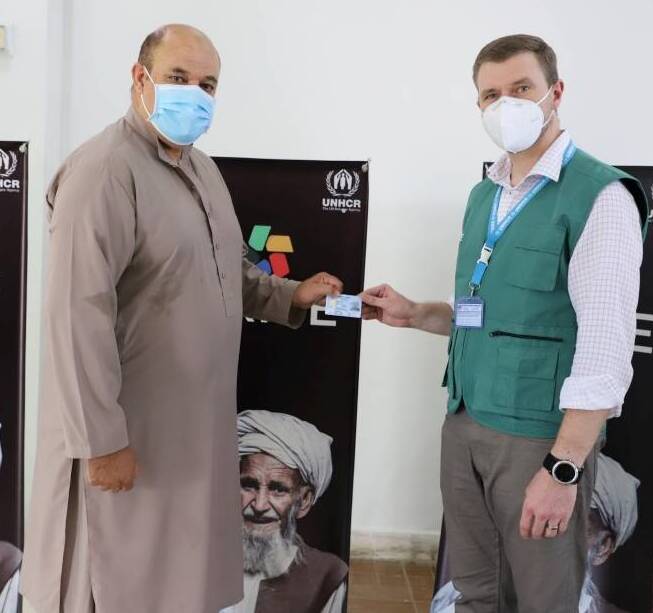Government of Pakistan delivers first new biometric identity smartcards to Afghan refugees

Government of Pakistan delivers first new biometric identity smartcards to Afghan refugees
UNHCR, 25 May 2021
URL: https://www.unhcr.org/asia/news/press/2021/5/60ae48424/government-of-pakistan-delivers-first-new-biometric-identity-smartcards.html
Pakistan’s National Database and Registration Authority (NADRA) issued today the first new biometric identity smartcards to Afghan refugees registered in the country.
The new Proof of Registration (PoR) cards are legally recognized proof of identity and include enhanced security features.
This card issuance is part of the government-led and UNHCR-supported Documentation Renewal and Information Verification Exercise (DRIVE).
This exercise is currently verifying the information of 1.4 million registered Afghan refugees in Pakistan and will issue them with new PoR smartcards based on the same technology used for Pakistani citizen identification cards.
Refugees who completed their DRIVE verification interviews will begin receiving SMS notifications advising them of when and where their new PoR smartcards can be collected.
“The DRIVE exercise is a joint effort between the Government of Pakistan/Ministry of States and Frontier Regions (SAFRON) and UNHCR, with the technical assistance of NADRA,” said Saleem Khan, the Chief Commissioner for Afghan Refugees in Pakistan.
The UNHCR Representative in Pakistan, Noriko Yoshida, appreciated the Government’s efforts for taking this important exercise forward, seeing it as an important opportunity to strengthen the protection of refugees and better understand existing needs in the refugee community.
“DRIVE will provide updated information on registered Afghan refugees and their immediate family members in Pakistan. This will allow us to better plan and deliver our support to the Government of Pakistan and refugees, as well as the communities hosting them.”
The designated NADRA Spokesperson said that the new PoR smartcards that are being issued as part of this exercise are multi-biometric, offering new possibilities for identity verification, including in the banking sector.
DRIVE is also part of a wider effort to assist displaced Afghans through the Support Platform for the Solutions Strategy for Afghan Refugees (SSAR). The exercise will help collect data on the educational and professional backgrounds of refugees. This information will enhance support for those who may in the future return voluntarily to Afghanistan.
The exercise is scheduled to be completed by the end of the year. Measures are in place at all DRIVE sites to mitigate COVID-19 risks through enhanced hygiene, physical distancing, and the scheduling of set numbers of appointments each day.
The new Proof of Registration (PoR) cards are legally recognized proof of identity and include enhanced security features.
This card issuance is part of the government-led and UNHCR-supported Documentation Renewal and Information Verification Exercise (DRIVE).
This exercise is currently verifying the information of 1.4 million registered Afghan refugees in Pakistan and will issue them with new PoR smartcards based on the same technology used for Pakistani citizen identification cards.
Refugees who completed their DRIVE verification interviews will begin receiving SMS notifications advising them of when and where their new PoR smartcards can be collected.
“The DRIVE exercise is a joint effort between the Government of Pakistan/Ministry of States and Frontier Regions (SAFRON) and UNHCR, with the technical assistance of NADRA,” said Saleem Khan, the Chief Commissioner for Afghan Refugees in Pakistan.
The UNHCR Representative in Pakistan, Noriko Yoshida, appreciated the Government’s efforts for taking this important exercise forward, seeing it as an important opportunity to strengthen the protection of refugees and better understand existing needs in the refugee community.
“DRIVE will provide updated information on registered Afghan refugees and their immediate family members in Pakistan. This will allow us to better plan and deliver our support to the Government of Pakistan and refugees, as well as the communities hosting them.”
The designated NADRA Spokesperson said that the new PoR smartcards that are being issued as part of this exercise are multi-biometric, offering new possibilities for identity verification, including in the banking sector.
DRIVE is also part of a wider effort to assist displaced Afghans through the Support Platform for the Solutions Strategy for Afghan Refugees (SSAR). The exercise will help collect data on the educational and professional backgrounds of refugees. This information will enhance support for those who may in the future return voluntarily to Afghanistan.
The exercise is scheduled to be completed by the end of the year. Measures are in place at all DRIVE sites to mitigate COVID-19 risks through enhanced hygiene, physical distancing, and the scheduling of set numbers of appointments each day.